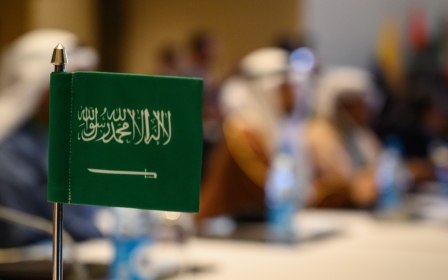Amnesty demands that Saudi Arabia free remaining women activists in jail

Amnesty International has demanded that six women activists held by Saudi Arabia "must all be unconditionally and immediately released".
The rights group said four women remain detained pending trial – Loujain Hathloul, Maya’a al-Zahrani, Nouf Abdulaziz and Shadan al-Anezi – as well as two others who have yet to be charged.
Last month, Hathloul’s brother, Walid, said the detained activist had no access to legal representation.
Amnesty’s call comes on the heels of Saudi Arabia’s conditional release of four women’s rights activists the day before.
At the time, the Saudi court said it ordered their release "after it studied their requests submitted during the trial sessions", the state-run SPA news agency reported.
New MEE newsletter: Jerusalem Dispatch
Sign up to get the latest insights and analysis on Israel-Palestine, alongside Turkey Unpacked and other MEE newsletters
Riyadh has accused about a dozen women's rights advocates, several of whom had campaigned for women's right to drive vehicles in the country, of harming Saudi Arabia's national interests and being "agents of embassies".
The women were detained last year as part of a wider wave of arrests in the Gulf kingdom, as Saudi Arabia's powerful Crown Prince Mohammed bin Salman launched a crackdown on dissent.
Activists say some detainees, including Hathloul, were held in solitary confinement and subjected to mistreatment and torture, including electric shocks, flogging and sexual assault.
Saudi officials have denied those allegations as "false".
Hathloul, who advocated for an end to a ban on women driving and the kingdom's male guardianship system, was previously detained for 73 days in 2014, after she attempted to drive into Saudi Arabia from the United Arab Emirates.
The driving ban was lifted in June, weeks after she was re-arrested. The guardianship system, which requires women to obtain the consent of a male relative for major decisions such as travel outside the country, remains intact.
Dozens of other activists, intellectuals and clerics have been arrested separately in the past two years in an apparent bid to stamp out opposition to the crown prince, who has consolidated power partly through his sweeping "anti-corruption" campaign.
The women's arrests have intensified international criticism of Saudi Arabia after the murder of journalist Jamal Khashoggi last October in the Saudi consulate in Istanbul sparked global outrage.
Middle East Eye delivers independent and unrivalled coverage and analysis of the Middle East, North Africa and beyond. To learn more about republishing this content and the associated fees, please fill out this form. More about MEE can be found here.





